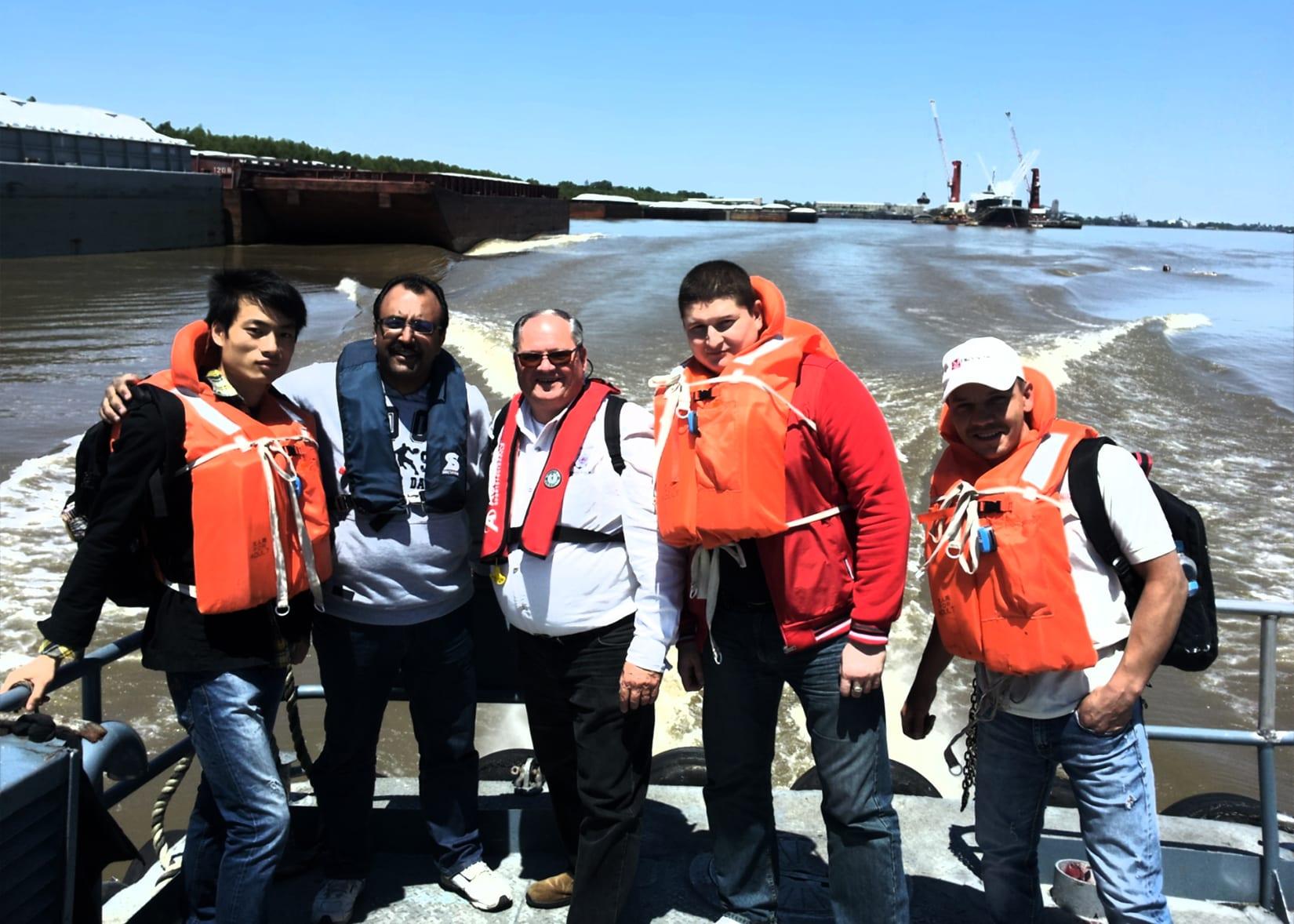CLEVELAND, Ohio — Cargo ships from around the world may be docking at the port of Charleston, South Carolina, but for Deacon Paul Rosenblum, the days are pretty quiet.
As the lone port minister for the Diocese of Charleston’s Apostleship of the Sea ministry, Rosenblum, 66, has opted for staying off the ships so he doesn’t accidentally bring any illness — the new coronavirus or otherwise — to seafarers.
“I’m not going on ships unless they make a request for me to come onboard,” he said. “That’s an oddity right now. Most of the foreign crews are self-isolating. The American crews are not so diligent about things.”
Rosenblum works with the Charleston Port and Seafarers’ Society to serve the crews of oceangoing vessels. He works alongside an Episcopal priest and an administrator. The ministry involves talking with crew members, offering rides for shopping, staffing a seafarer center and simply being present.
Not personally meeting seafarers makes it difficult to minister to their personal and spiritual needs. But all involved know that it’s for the better for the time being, he said.
Rosenblum understands the seafarers, almost exclusively young men, must keep themselves safe from illness. At sea, there’s no access to care outside of basic first aid and it can be days between ports of call. An illness can spread quickly among the crew, who spend much of their time in tight quarters.
By law, a ship’s captain must report any illness on board to the U.S. Coast Guard before docking. In shipping, time is money, and any illness can cause a delay in delivering millions of dollars of cargo.
The coronavirus has disrupted the routines of Catholic port ministers across the U.S. and Canada. Deacon Jose Deleon, 68, who works with the Archdiocese of Seattle’s Catholic Seafarers Ministry, said he last visited a ship March 19. “We’re pretty much down to zero,” he said.
Deacon Wayne Lobell, who runs the Stella Maris Maritime Center West for the Archdiocese of New Orleans, has shut down his outreach efforts because of the exponential growth in reported COVID-19 cases in southern Louisiana.
“The detriment is we can be more of a problem to them than they are to us,” Lobell, 69, told Catholic News Service March 25.
“For the past two weeks, I haven’t had any calls at all. I don’t know if the agents are telling them (seafarers) to stay on board. We don’t want to deny them to come to shore, but it could be more of a problem if they got off. They they’d have to clean the entire ship. We’ve decided to stay away from that,” Lobell said.
Deacon Dileep Athaide, 70, is coordinator of the archdiocesan Catholic chaplaincy service in the port of Vancouver, British Columbia, Canada’s largest. He said port officials had closed the seafarers center, a place where crew members could gather, arrange for rides for shopping, buy cellphone SIM cards or hang out. The center is the place where Athaide often interacted with seafarers. Not now.
“They’re just being safe,” Athaide said.
In normal times, the deacons would lead Communion services on ships when time allowed. They distributed rosaries and prayer cards, delivered specialty baked goods, and counsel the men who often are away from home for up to 10 months at a time.
Even before the onset of COVID-19, the need for such basic services has declined as port stops have been shortened through automation. Ships unload and reload in a matter of hours, leaving little time for crew members to take care of personal needs and less time for a minister to conduct even a 15-miniute prayer service, the deacons said.
Many of the crews primarily consist of Filipinos. Indians also are common, while some East Europeans are occasionally are on board. Hailing from a predominantly Catholic country, Filipinos most often appreciate the outreach, Deleon said.
“In some cases, they’d want to go to confession,” said Deleon, himself a Filipino. “I’m trying to schedule a priest to come whenever I can to come with me. But that is very rare.”
Rosenblum in Charleston has made friends with some crew members, keeping in touch via social media or email. Once in a while an old friend will return to port and both seek out each other. But mostly, he said he realizes he won’t see the men he meets ever again.
“I tell people they minister to me as much as I minister to them,” he said.
Beyond the ship crews, the deacons said they maintain good relationships with port staff, including the pilots who meet a ship and guide a captain through a harbor into a berth. Lobell in New Orleans said one river pilot, who is a devout Catholic, often acts as his eyes and ears on a ship and points out someone who is in special need. The pilot also has been authorized as an extraordinary minister of holy Communion by the archdiocese and will distribute the Eucharist — when there’s time.
For now, until the COVID-19 pandemic eases, the deacons will continue to show up at the ports, hoping to be of service to anyone they run into, be they seafarers, longshoremen or security officials.
“We’ll see,” Athaide said. “It’s such a fluid situation. It’s changing all the time.”
Crux is dedicated to smart, wired and independent reporting on the Vatican and worldwide Catholic Church. That kind of reporting doesn’t come cheap, and we need your support. You can help Crux by giving a small amount monthly, or with a onetime gift. Please remember, Crux is a for-profit organization, so contributions are not tax-deductible.















